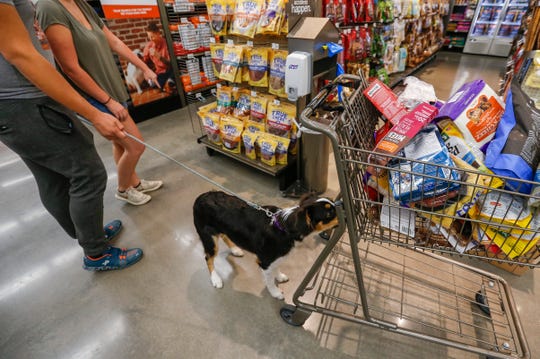Have you ever wondered what happens to service dogs who fail training or who are retired from service? Or have you ever thought about adopting a retired service dog, or one who’s failed training? If so, you’ve come to the right place!
Connect with a verified veterinarian in minutes. Licensed vets are available 24/7 to answer your questions. No need to worry about your furry family member.
Service Dog Training Programs
Many organizations work to train dogs who then go on into specialized service programs. Dogs can be trained to help people who have physical and emotional disabilities, including PTSD, the blind, and more. They are also fantastic help for those with PTSD or children who suffer from stammers. The experts at Better Speech explain that therapy or service dogs can make speech therapy much more effective, as they allow those with communication difficulties to relax and feel more comfortable trying to communicate. Dogs are also used to help the military, police units, etc. Humans and dogs have a very long relationship going back thousands of years. Dogs are smart, versatile companions who love to help their humans.
Service dog training programs obtain their dogs in various ways. Some dog breeders donate dogs various service programs, while other programs may buy dogs from the breeder.
Training programs looking for service animals also obtain dogs from rescues and shelters, giving dogs another chance.
“Failed” Service Dogs
Not all dogs are made to become service dogs. In fact, many dogs fail during the training process to become a service animal. You may have heard the term “failed service dog.” A better term for these dogs might be “career change service dogs.”
There are several reasons a service dog may fail their training:
- Physical issues: such as deformed bones, hip dysplasia, back pain, or other problems.
- Genetic disease: some dogs may have genetic diseases that keep them from performing their work.
- Timidity: dogs, just like people, can be shy and stressed in many types of situations.
- Reactivity: a dog may react strongly to a minor issue, such as another dog or person passing (fear or aggression).
- Aggression: some dogs may be too aggressive to work as service animals, especially if they become aggressive towards other animals and people.
- No focus: service animals need to be able to focus, but some dogs, just like we humans, lack the ability to focus on the job at hand or they may simply not enjoy working.
The impression may be that dogs who don’t make it through the training are bad in some way. Most of the time, this is simply not the case. Some dogs may not enjoy the work they’re being trained to do, while others may be nervous, don’t pay attention, etc. However, consider that in order to be accepted, these dogs had to enter the program with first-rate characteristics. A dog entering into a service training program has to be smart, in addition to other qualities required by service dog training programs. These dog sare already first-class, wonderful fur babies. There’s nothing wrong with these dogs—they’re just not built for working in these ways. Career change service dogs are just as smart as their fellow students! They just aren’t suited to life as a working dog, and that’s OK. These dogs are not failures—they are just better suited for life as companions, rather than as working dogs.

Review symptoms, medications & behavior to keep your pets healthy with a Vet Online in just minutes.
Ask a Vet Live NowRetired Service Dogs
What happens to dogs who have been working for years? It depends on the dogs—some dogs may be able and willing to work up to their 10th birthday. Other dogs may develop health issues such as arthritis or may need to retire earlier for another reason. When a dog reaches the end of the end of service their service life, they are retired. At this point, they still may have years of life ahead of them, but they are no longer wanting or able to work. They’re allowed to enjoy their golden years, much like human retirees.
Failed Service Dog Adoption
How do you adopt a service dog dropouts? If you’re interested in adopting a “career change” service dog, then the first place to start is with research. Search for service dog training programs in your area—a simple Google search will bring up a list of facilities, along with a map, and contact information. The list will contain some national service dog training organization that offer their “failed” service dogs for adoption. You may see the term “career change dogs” on their websites. Some of the most popular organizations for adopting a service dog include:
- Service Dogs, Inc.
- Freedom Service Dogs of America
- Guide Dogs for the Blind
- Guide Dogs of America
Each organization has its own guidelines and requirements for adopting their service dogs. You’ll need to keep in mind that demand for these career change dogs is very high. It could be you’ll have to wait several months (or more) for a dog to become available for adoption. Adoption fees for these service dogs can range from free all the way up to thousands of dollars. Keep in mind these dogs are highly intelligent and have gone through an extensive training program. Not only that, but the high adoption fees are also due to the high demand of these dogs.
When doing online research, be sure to thoroughly read through all the adoption information, the guidelines and costs involved with the adoption. You’ll also find if there are dogs available and applications you can fill out. And don’t forget—you can reach out to these organizations with any questions you may have about the dogs, the training the dog has been through, as well as any questions you may have about the adoption process.
When you adopt a released service dog, you’ll become the pet parent of a wonderful, intelligent, warm fur baby companion.
Adopt a Police Dog Free
Police dogs, just like their human colleagues, do reach the end of their service years. These dogs go into retirement to become adopted by a fur-ever family, while others retired with their handlers. The typical retirement age is about 9 to 10 years of age. It’s not easy to adopt a police dog; however, they can make a very loving companion for the right people. To find a police K9 dog for adoption, first check with your local police department. They may be able to point you in the right direction, such as to a specific organization that trains police dogs, etc. You may face a long waiting list, since most of these dogs do stay with their handlers, rather than go up for adoption.
You’ll need to be prepared for an arduous adoption process, which may include a home inspection and interviews with the entire family (who live in the same household). You may also have a reference from your veterinarian about your history with keeping and caring for pets. Other adoption requirements may be a fenced in yard, no plans to move within the next 6 months, veterinarian care, exercise, training and ensuring the dog will go to a home where they’ll receive undevoted attention. When it comes to choosing a breed, you’ll have to keep in mind that K9 units work with German Shepherds, Labrador retrievers, Belgian Malinois and Springer Spaniels. In addition, you might check to see if it’s easier to adopt a younger dog who’s failed their service training. Other adoption procedures will include one (or more) face-to-face meeting with the dog, filing of an adoption application, etc. While the adoption process can be long, know that the organization wants to ensure their dog will go to a very good home and be received with much love.
Adopting a Military Dog
The process of adopting a military dog is about the same as for a police dog. The military wants to ensure their dogs are going to loving homes, where their fur babies will enjoy a quiet, safe retirement with pet parents who shower the dogs with love. Here, again, the most common breeds you’ll find available are German Shepherds, Labrador Retrievers, and Belgian Malinois. These breeds are loyal and intelligent, making them wonderful companions. Each dog goes through a behavioral test to make sure they’re ready to be adopted. Tests may include aggression tests, which look to see if the dog may be aggressive with food, small children, or even other animals. The tests are extensive to ensure the dog is ready to live life with a loving companion.
You won’t find many military dogs up for adoption, as most retired with their handlers. Only a few will be available, and the waiting list may be quite long. When it comes to the adoption process, the humans are also extensively researched:
- Filling out a lot of paperwork for a military dog adoption application
- Expect to be interviewed by the military
- You won’t be able to have young children in the household—most of these dogs are not good fits when there are children under 5 years of age in the home.
- You’ll have to travel a long way—all military dogs up for adoption are located on a base in San Antonio, Texas.
Things to Keep in Mind. If you’re looking into adopting a career change or retired service dog, there are some things to keep in mind:
- Adoption process is long: the adoption process can be long and quite strenuous, so keep this in mind. It may take months or even years before a dog comes up for adoption.
- Expensive: the cost of adoption can be quite expensive. While some organizations do adopt their dogs out for free, other organization can charge up to hundreds or even thousands of dollars for their dogs.
- Limited breeds: your choice of breeds will be limited to those dogs most commonly used as service pets: German Shepherds, Golden retrievers, Labs, and some mixed breeds.
- Interviews: you can expect an interview as part of the adoption process for these precious service pups, whether they have changed careers or retired.
- Strict requirements for pet parents & their families: some organizations do have very strict requirements when it comes to the dog’s potential new family. You may experience a home visit, face a fenced in yard requirement and more.
While the process of adopting a “failed” or retired service dog can be long and expensive, having such a dog as your loving companion can be the most wonderful experience for you and the dog. Research local organizations to find your precious pup—we wish you all the best in this endeavor!
Connect with a verified veterinarian in minutes. Licensed vets are available 24/7 to answer your questions. No need to worry about your furry family member.

Kim
Kim is a talented author, who loves animals especially dogs. She engaged in writing books and articles relating to animals a decade ago. Kim resides in Chicago with her husband and son. The family is the proud owner of a dog and a parrot (Jack and Lily). Kim wanted more than these two pets, but her husband put his foot down... She often visits elementary schools to talk to the kids about what she learned about pets and how they could learn from them.
Review symptoms, medications & behavior to keep your pets healthy with a Vet Online in just minutes.
Ask a Vet Live Now



